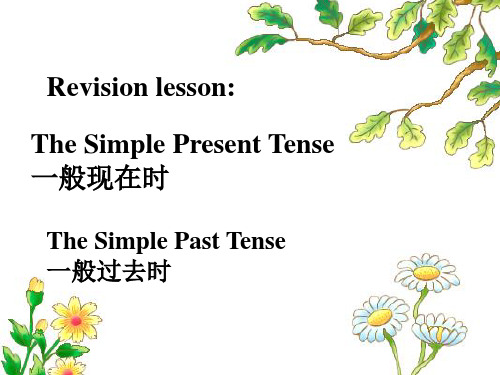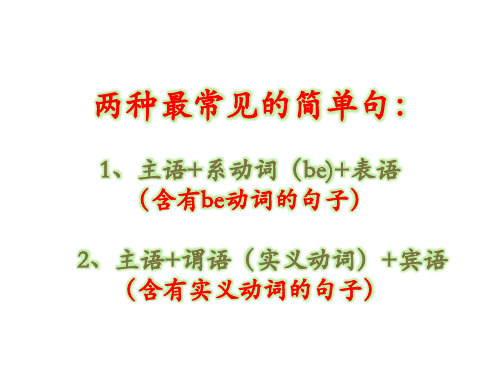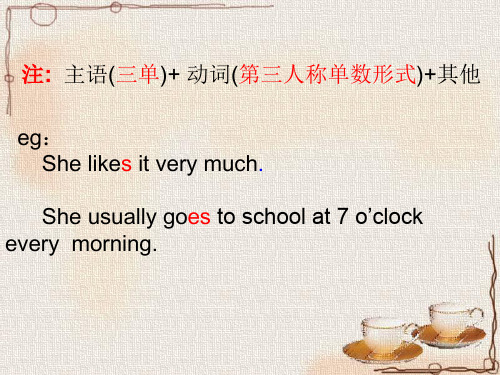初中英语语法基本时态 (一般现在时和一般过去时)课件
合集下载
一般现在时现在进行时和一般过去时和一般将来时态ppt课件

• I was not born in 1980. • Were you born in 1980?
经营者提供商品或者服务有欺诈行为 的,应 当按照 消费者 的要求 增加赔 偿其受 到的损 失,增 加赔偿 的金额 为消费 者购买 商品的 价款或 接受服 务的费 用
第二种
含有行为动词的
• 肯定结构 • 主语+行为动词(过去式)+其它
加es.如:study carry
练习:写出下列动词的三单形式
enjoyS stays plays stops runs
have has are is
经营者提供商品或者服务有欺诈行为 的,应 当按照 消费者 的要求 增加赔 偿其受 到的损 失,增 加赔偿 的金额 为消费 者购买 商品的 价款或 接受服 务的费 用
• 3)末尾只有一个辅音字母的重读闭音节,应先双 写这个辅音字母,再加-ed.
• e.g. shop-----shopped; stopped
• 4)以"辅音字母+y"结尾的动词,先把y变成i,再加ed. e.g. carry----carried; study------studied.
经营者提供商品或者服务有欺诈行为 的,应 当按照 消费者 的要求 增加赔 偿其受 到的损 失,增 加赔偿 的金额 为消费 者购买 商品的 价款或 接受服 务的费 用
prefer preferring
经营者提供商品或者服务有欺诈行为 的,应 当按照 消费者 的要求 增加赔 偿其受 到的损 失,增 加赔偿 的金额 为消费 者购买 商品的 价款或 接受服 务的费 用
一般过去时
•
一般过去时主要表示过去某时发生的动作或 情况
• 1态)。过去某个时间所发生的动作或存在的状
经营者提供商品或者服务有欺诈行为 的,应 当按照 消费者 的要求 增加赔 偿其受 到的损 失,增 加赔偿 的金额 为消费 者购买 商品的 价款或 接受服 务的费 用
第二种
含有行为动词的
• 肯定结构 • 主语+行为动词(过去式)+其它
加es.如:study carry
练习:写出下列动词的三单形式
enjoyS stays plays stops runs
have has are is
经营者提供商品或者服务有欺诈行为 的,应 当按照 消费者 的要求 增加赔 偿其受 到的损 失,增 加赔偿 的金额 为消费 者购买 商品的 价款或 接受服 务的费 用
• 3)末尾只有一个辅音字母的重读闭音节,应先双 写这个辅音字母,再加-ed.
• e.g. shop-----shopped; stopped
• 4)以"辅音字母+y"结尾的动词,先把y变成i,再加ed. e.g. carry----carried; study------studied.
经营者提供商品或者服务有欺诈行为 的,应 当按照 消费者 的要求 增加赔 偿其受 到的损 失,增 加赔偿 的金额 为消费 者购买 商品的 价款或 接受服 务的费 用
prefer preferring
经营者提供商品或者服务有欺诈行为 的,应 当按照 消费者 的要求 增加赔 偿其受 到的损 失,增 加赔偿 的金额 为消费 者购买 商品的 价款或 接受服 务的费 用
一般过去时
•
一般过去时主要表示过去某时发生的动作或 情况
• 1态)。过去某个时间所发生的动作或存在的状
英语时态8种基本时态讲解.ppt课件

4)动词过去式变化规则。 a)一般情况下的词加-ed. work---worked call----called b)以不发音的字母e结尾的单词直接加-d . live----lived change----changed smoke----smoked die----died graduate----graduated drive----drove
8.过去完成时 表示动作发生在过去某一时间之前已经完成的动作或状态, 强调“过去的过去”, 常与 by the time, by the end of…,before , by 等引导时间的状语连用。
基本结构 主语+ had + 动词过去分词 + 其他成分 When I got to the cinema yesterday the film had begun already. He had learned English before he came here.
现在完成时与一般过去时的区别: 1)现在完成时侧重于对现在的影响;而一般过去时侧重于某一动作发生在过去某个时间或某段时间。即现在完成时侧重于现在的结果,而一般过去时侧重于动作发生的时间。例如:
I have seen the film. 我看过这部电影。(现在我仍记得电影的内容) I saw the film three days ago. 三天前我看了这部电影。(强调是三天前,而不是别的什么时候看的电影)
be going to含有“打算,准备”的意思,而will则没有这个意思, She is going to lend us her book. He will be here in half an hour.
be about to+V.原形(意为马上做某事,在时间上指最近的将来) I am about to leave school. 不能与表示时间的副词连用。 They are about to set out.(√) They are about to set,变y为i加-ed. study----studied carry----carried cry----cried try----tried d)以元音字母+y结尾的单词直接加-ed. play----played stay----stayed
8.过去完成时 表示动作发生在过去某一时间之前已经完成的动作或状态, 强调“过去的过去”, 常与 by the time, by the end of…,before , by 等引导时间的状语连用。
基本结构 主语+ had + 动词过去分词 + 其他成分 When I got to the cinema yesterday the film had begun already. He had learned English before he came here.
现在完成时与一般过去时的区别: 1)现在完成时侧重于对现在的影响;而一般过去时侧重于某一动作发生在过去某个时间或某段时间。即现在完成时侧重于现在的结果,而一般过去时侧重于动作发生的时间。例如:
I have seen the film. 我看过这部电影。(现在我仍记得电影的内容) I saw the film three days ago. 三天前我看了这部电影。(强调是三天前,而不是别的什么时候看的电影)
be going to含有“打算,准备”的意思,而will则没有这个意思, She is going to lend us her book. He will be here in half an hour.
be about to+V.原形(意为马上做某事,在时间上指最近的将来) I am about to leave school. 不能与表示时间的副词连用。 They are about to set out.(√) They are about to set,变y为i加-ed. study----studied carry----carried cry----cried try----tried d)以元音字母+y结尾的单词直接加-ed. play----played stay----stayed
人教七下语法一般现在时和一般过去时(共23张PPT)

Practice
The next morning before class, he called Tom 5 his desk and 6 to him, “You got all your homework right this time. Did your father help you?” Sometimes Tom’s father helped him with his homework, 7 this time he didn’t help Tom because he 8 at home. So Tom answered, “No, Sir. He was busy last night, so I 9 to do it 10 .”
动词原形 sit
swim draw sing can sleep meet read
过去式 sat
swam drew sang could slept met read
Language points
动词原形 teach say begin give drink let spend
过去式 taught
Practice
改错题
1. How is Jane yesterday? 2. He go to school by bus every day. 3. He often goes home at 6:00 last month. 4. She can flys kites now. 5. Did you saw him just now. 6. She stayes at home last weekend.
Language points
写出下列动词的过去式 smile drop shop carry cry stay
初中英语七种时态 初中英语语法 教学PPT课件

1.改为一般疑问句并回答。 Are you doing your homework now? Yes, I am./No, I'm not. 2.改为否定句。
I am not doing my homework now.
五、过去进行时 1.过去进行时:表示在过去某一时刻或某一阶
段正在进行的动作。
2.常用时间状语: at that time, at 8:00 last
4)表示客观真理,客观存在,自然现象。 例如:The earth moves around the sun.
地球绕太阳转动。
I do my homework every day.
1.改为一般疑问句并回答。 Do you do your homework every day? Yes, I do./No, I don't. 2.改为否定句。
2.过去进行时的用法:
表示在过去某时刻正在进行或发生的动作,通常与表 示过去的时间壮语连用。
例如:At this moment yesterday, I was packing for camp. 昨天这个时候间壮语从句的复合句中,表示一个过去的 动作发生时或发生之后,另一个动作正在进行。
close
sit begin run put
lie die tie
-ing形式
listening spending staying
having preparing
closing
sitting beginning running
putting
lying dying tying
I am doing my homework now.
like live
plan stop drop
I am not doing my homework now.
五、过去进行时 1.过去进行时:表示在过去某一时刻或某一阶
段正在进行的动作。
2.常用时间状语: at that time, at 8:00 last
4)表示客观真理,客观存在,自然现象。 例如:The earth moves around the sun.
地球绕太阳转动。
I do my homework every day.
1.改为一般疑问句并回答。 Do you do your homework every day? Yes, I do./No, I don't. 2.改为否定句。
2.过去进行时的用法:
表示在过去某时刻正在进行或发生的动作,通常与表 示过去的时间壮语连用。
例如:At this moment yesterday, I was packing for camp. 昨天这个时候间壮语从句的复合句中,表示一个过去的 动作发生时或发生之后,另一个动作正在进行。
close
sit begin run put
lie die tie
-ing形式
listening spending staying
having preparing
closing
sitting beginning running
putting
lying dying tying
I am doing my homework now.
like live
plan stop drop
时态(一般现在时一般过去时一般将来时)(课堂PPT)

C. I haven’t noticed D. I don’t notice
15
(4) ——Oh it’s you ! I _________ you. ——I’ve had my hair cut. A. didn’t realize B. haven’t realized C. didn’t recognize D. don’t recognized (5) ——It’s twelve o’clock, I think I must be off now.
•——But he _________.
A. promises
B. promised
C. will promise
D. had promised
(3) ——Hey, look where you are going!
• ——Oh, I’m terribly sorry. _________. A. I’m not noticing B. I wasn’t noticing
在的状态
2
The Simple Present Tense
你我和大家, (You,I and they)
动词不变化。 (the Verb stays )
单数三人称, (if only one ) 带个小尾巴。 (”S” to the end)
TheDomyooun lmikoevsems orokuinngd?the
A. play B. plays C. playing D. played 2.My mother will take me to the movie if she _________ free this weekend.
A. is B. will be C. was D. would be 3.The girls will have a trip if it _________fine.
一般现在时一般过去时教学课件

1、表示过去某个时间 发生的动作或存在的状 态。 2、表示过去经常或反 复ቤተ መጻሕፍቲ ባይዱ生的动作 I bought a computer last week. There was a bridge over the river before. We walked to school last year.
The Simple Present Tense 一般现在时
对下列句子画线部分提问: 1. It took me 10 minutes to walk to school.
How long did it take you to walk to school?
2. He does homework after dinner.
What does he do after dinner?
2.We like maths. We don’t like maths.
Do you like maths? Yes, we do/ No , we don’t.
3.They went swimming last Sunday.
They didn’t go swimming last Sunday. Did they go swimming last Sunday? Yes ,they did.
• 2.live-lived
• 3. stop-stopped
• 4.study-studied
The Simple Present Tense 一般现在时
The Simple Past Tense 一般过去时
否 She isn’t an engineer. 定 She doesn’t work there. Tom and Jim don’t like sports. 疑 Is she an engineer? 问 (Yes,she is./No, she isn’t.) 句 Does she work there?
初中英语语法基本时态-(一般现在时和一般过去时)课件

1、含有be动词的句子,一般现在时be(am,is, are)要变否定句和一般疑问句就根据be动词用法口 诀走:
be动词有3个am/is/are,具体用哪一个根据主 语的变化而变化,我是am,I am,你是are, You are, 还有We are 和They are, is 连着他她 它,he is; she is; it is, 单数名词用is ,复数名 词全用are,变疑问(be)往前提,句末问 号莫忘记,变否定更容易be后not莫忘记, 疑问否定任你变句首大写莫迟疑。
我喜欢打豆豆。我天天打豆豆。 我正在打豆豆。 我以前不打豆豆。 我昨天早上正在打豆豆。 我今天早上已经打过豆豆了。 昨天下午之前我已经打过豆豆了。
过去
↑
1995
2008
↓
现在
将来
↑
2030
2018
↓
年份
一般现在时的概念: 1、表示习惯性或经常性的动作或状态
I often take school bus to school.
❖答案:1. Does have 2. doesn't live 错误:1. Does has 2. not live
❖解析: ❖ 单三人称做主语的一般现在时做句式变化时,可记 住如下口诀:“见助动,用原形”。此口诀也可推广用于 一般过去时态中。 ❖ 例如: He didn't go home yesterday.
❖ 时间状语:
often(经常)、 usually(通常)、 always (总是)、 sometimes(有时)等频率副词, on Saturdays(在星期六)、 in the morning(afternoon evening)(在早上(下午 晚上)) 、every day(每天) 等。
be动词有3个am/is/are,具体用哪一个根据主 语的变化而变化,我是am,I am,你是are, You are, 还有We are 和They are, is 连着他她 它,he is; she is; it is, 单数名词用is ,复数名 词全用are,变疑问(be)往前提,句末问 号莫忘记,变否定更容易be后not莫忘记, 疑问否定任你变句首大写莫迟疑。
我喜欢打豆豆。我天天打豆豆。 我正在打豆豆。 我以前不打豆豆。 我昨天早上正在打豆豆。 我今天早上已经打过豆豆了。 昨天下午之前我已经打过豆豆了。
过去
↑
1995
2008
↓
现在
将来
↑
2030
2018
↓
年份
一般现在时的概念: 1、表示习惯性或经常性的动作或状态
I often take school bus to school.
❖答案:1. Does have 2. doesn't live 错误:1. Does has 2. not live
❖解析: ❖ 单三人称做主语的一般现在时做句式变化时,可记 住如下口诀:“见助动,用原形”。此口诀也可推广用于 一般过去时态中。 ❖ 例如: He didn't go home yesterday.
❖ 时间状语:
often(经常)、 usually(通常)、 always (总是)、 sometimes(有时)等频率副词, on Saturdays(在星期六)、 in the morning(afternoon evening)(在早上(下午 晚上)) 、every day(每天) 等。
一般现在时和一般过去时ppt课件

carryies do es wash es visit s exercise s enjoy s jump s hhaavse
一般现在时否定式
be + not don’t do / doesn’t do
II 一般现在时的否定式
1.Be 动词的否定式: be + not
I am a teacher.
把下列句子改为否定句
1.My father has an egg for breakfast . My father doesn’t have an egg for breakfast .
2.Li Lei does his homework after school. Li Lei doesn’t do his homework after school.
1. We often __p_la_y_ (play) in the playground. 2. He _g_et_s_ (get) up at six o’clock. 3. _D_o_ you b_r_u_s_h (brush) your teeth every morning? 4. What d_o_e_she usually_d_o_ (do) after school? 5. Danny_s_t_ud_i_e_s (study) English, Chinese, Maths, Science and Art at school. 6. Mike sometimes _g_o_es__(go) to the park with his sister. 7. She w_a_t_ch_e_s (watch) TV with his parents every evening. 8.D__oe_s_ Mike _r_ea_d_(read) English every day?
初中英语语法—时态(28张) PPT课件 图文

(4)现在完成时与表示一段时间的for短语、since短语或从句等 时,应注意句中的谓语动词须是延续性的,而不能是非延续性动词,如 come→be here,go→be there,die→be dead,borrow→keep,buy→h ,join→be in,leave→be away,begin to study→study等。
6.过去进行时
(1)概念:表示过去某一时刻或某一时间段内正在进行的动作。 (2)构成形式:was/were+动词的-ing形式 ①表示往返、位移的动词的过去进行时常可用来表示过去将来时
时态 We wanted to tell her that the train was_leaving an hour later.
1.一般现在时
基本用法: (1)表示经常性、习惯性的动作; He always helps others. 他总是帮助别人。
时态 (2)表示现在的情况或状态;
He is a teacher. 他是个老师。 (3)表示客观事实和普遍真理。 The sun rises in the east. 太阳从东边升起。 构成形式:am/is/are或实义动词的原形(主语是第三人称单数时,动 词要用第三人称单数形式)。
时态 (2)构成形式:have/has+动词的过去分词。
(3)与现在完成时连用的时间状语有for a long time,recently,yet, lately,ever,never,already,since,by this time,before,just,in t past/last few years,since+过去的时间点,since+时间段+ago,since +从句(一般过去时)。
表示感觉的动词。如:see,hear等。 表示喜欢或厌恶的动词。如:like,love等。 表示希望的动词。如:want,would like等。
一般现在时与一般过去时ppt(共17张PPT)

played
washed watched
Present — Past
原形 第三人称单数 过去式
cry study
cries studies
cried
studied
worry worries
worried
carry
绿色圃中小学教育网绿色圃中学资源 网
copy
carries copies
carried
时态
一般般过过去去去时时时::: 过去某个个时时间间或或时时间间段
(Thhee SSSiiimmmppplleleePast PTeanstseTT)eennssee))
段发生发的生动的作动或作存或在存的在状 的态。状态。
各时态常用的信息词
一般现在时:
always, usually, often, sometimes ,seldom,
第三人称单数
study- studies
finish- finishes
have- has
go- goes do- does
play-
plays watch-
watches give-
gives
过去式
need- needed
stop- stopped
hope- hoped
play- played try- tried
6. Lucy and Lily often ____re_ad_____(read) books.
7. There _______(is) a football match yesterday afternoon. was
8. Our class ______( go) to the zoo three days
washed watched
Present — Past
原形 第三人称单数 过去式
cry study
cries studies
cried
studied
worry worries
worried
carry
绿色圃中小学教育网绿色圃中学资源 网
copy
carries copies
carried
时态
一般般过过去去去时时时::: 过去某个个时时间间或或时时间间段
(Thhee SSSiiimmmppplleleePast PTeanstseTT)eennssee))
段发生发的生动的作动或作存或在存的在状 的态。状态。
各时态常用的信息词
一般现在时:
always, usually, often, sometimes ,seldom,
第三人称单数
study- studies
finish- finishes
have- has
go- goes do- does
play-
plays watch-
watches give-
gives
过去式
need- needed
stop- stopped
hope- hoped
play- played try- tried
6. Lucy and Lily often ____re_ad_____(read) books.
7. There _______(is) a football match yesterday afternoon. was
8. Our class ______( go) to the zoo three days
初中英语语法课件ppt

vacation together.
过去将来时的使用:
一、过去将来时表示对于过去某一时间而言将要发生的动 作或存在的状态。 would或was /were going to + V
would可用于各种人称。
二、would +V还可表示过去的习惯动作,在这点上同used to同义。
When we were children, we would/used to go swimming every summer.
e) 用于条件从句“如果……想,设想”(接近if ……want to,或 if ……should) 例:Greater efforts to increase agricultural production must be made if food shortage ____________ avoided. A) is to be B) can be C) will be D) has been
一般现在时的动词形式: 动词原形 1.am;is ;are 2.have,has 3.第三人称单数形式-(e)s
肯定句:I watch television every day.
否定句:I don’t watch television every day.
疑问句:Do you watch television every day.
一般现在时的使用:
1.一般现在时表示总是、通常、习惯 性的动作或状态。
It snows in winter. I watch television every day.
2.用于对客观事实的普遍性的陈述。
Water consists of hydrogen and oxygen. Most animals kill only for food. The world is round.
过去将来时的使用:
一、过去将来时表示对于过去某一时间而言将要发生的动 作或存在的状态。 would或was /were going to + V
would可用于各种人称。
二、would +V还可表示过去的习惯动作,在这点上同used to同义。
When we were children, we would/used to go swimming every summer.
e) 用于条件从句“如果……想,设想”(接近if ……want to,或 if ……should) 例:Greater efforts to increase agricultural production must be made if food shortage ____________ avoided. A) is to be B) can be C) will be D) has been
一般现在时的动词形式: 动词原形 1.am;is ;are 2.have,has 3.第三人称单数形式-(e)s
肯定句:I watch television every day.
否定句:I don’t watch television every day.
疑问句:Do you watch television every day.
一般现在时的使用:
1.一般现在时表示总是、通常、习惯 性的动作或状态。
It snows in winter. I watch television every day.
2.用于对客观事实的普遍性的陈述。
Water consists of hydrogen and oxygen. Most animals kill only for food. The world is round.
初中英语 一般现在时与一般过去时(共42张ppt)

(3)以“辅音字母加 - y”结尾的动词,要先变y为i再加-es. try---tries study---studies cry---cries fly---flies
一般现在时 三单
(1)直接在动词词尾加-s. ask---asks work---works get---gets stay---stays
2.表示客观真理、事实、人的技能或现 在的状态时的句子一般不用时间状语。
Eg : The earth moves around the sun. Light travels faster than sound.
一般现在时 Use
3. 表十分确定会发生(如安排好的 事情)或按照时间表进行的事情。
用一般现在表将来,如begin、 come、go、leave、 start 、arrive等 词。 Eg: The train for Xiamen leaves at 8:00 in the morning.
4.时间状语从句和条件状语从句中,用 一般现在时表将来时。
Eg: Please ring me up as soon as you arrive in American. If it rains tomorrow, we will have to stay at home.
一般现在时 Structure
01 课 堂 导 入
ONE
The Old Cat:
An old woman had a cat. The cat was very old; she could not run quickly, and she could not bite, because she was so old. One day the old cat saw a mouse; she jumped and caught the mouse. But she could not bite it; so the mouse got out of her mouth and ran away, because the cat could not bite it. Then the old woman became very angry because the cat had not killed the mouse. She began to hit the cat. The cat said, "Do not hit your old servant. I have worked for you for many years, and I would work for you still, but I am too old. Do not be unkind to the old, but remember what good work the old did when they were young."
一般现在时 三单
(1)直接在动词词尾加-s. ask---asks work---works get---gets stay---stays
2.表示客观真理、事实、人的技能或现 在的状态时的句子一般不用时间状语。
Eg : The earth moves around the sun. Light travels faster than sound.
一般现在时 Use
3. 表十分确定会发生(如安排好的 事情)或按照时间表进行的事情。
用一般现在表将来,如begin、 come、go、leave、 start 、arrive等 词。 Eg: The train for Xiamen leaves at 8:00 in the morning.
4.时间状语从句和条件状语从句中,用 一般现在时表将来时。
Eg: Please ring me up as soon as you arrive in American. If it rains tomorrow, we will have to stay at home.
一般现在时 Structure
01 课 堂 导 入
ONE
The Old Cat:
An old woman had a cat. The cat was very old; she could not run quickly, and she could not bite, because she was so old. One day the old cat saw a mouse; she jumped and caught the mouse. But she could not bite it; so the mouse got out of her mouth and ran away, because the cat could not bite it. Then the old woman became very angry because the cat had not killed the mouse. She began to hit the cat. The cat said, "Do not hit your old servant. I have worked for you for many years, and I would work for you still, but I am too old. Do not be unkind to the old, but remember what good work the old did when they were young."
一般现在时、一般过去时和一般将来时课件(PPT31张)

I/You/He/She/It/ We/ You/They worked.
Was I…. ? Was he/she/it…? Were we/you/they…? Was/Were there …? Did I/you/he/she/it/ we/ you/they work
I was not(wasn’t)…. He/She/It was not (wasn’t)…. We/You/They were not (weren’t)… There was/were not….
( C ) Alice is a nice girl. She ____ to
help others.
A. ready
B. always glad
C.is always D.is always ready
__D_o__ Sam and his friends often _p_la_y__(play) games during the morning break?
A. will meet B meet C. am waiting D wait
9. Where A___ after class today?
A. will you go B. are you go C. you are going D. you will go
10. –It’s 7 p.m. They did not eat anything .
husband or son?
-- _A___
A. Yes , she will B. Yes, she visits C. Yes, with her son D. With her son
5. There _C___ a wonderful football match tomorrow.
Was I…. ? Was he/she/it…? Were we/you/they…? Was/Were there …? Did I/you/he/she/it/ we/ you/they work
I was not(wasn’t)…. He/She/It was not (wasn’t)…. We/You/They were not (weren’t)… There was/were not….
( C ) Alice is a nice girl. She ____ to
help others.
A. ready
B. always glad
C.is always D.is always ready
__D_o__ Sam and his friends often _p_la_y__(play) games during the morning break?
A. will meet B meet C. am waiting D wait
9. Where A___ after class today?
A. will you go B. are you go C. you are going D. you will go
10. –It’s 7 p.m. They did not eat anything .
husband or son?
-- _A___
A. Yes , she will B. Yes, she visits C. Yes, with her son D. With her son
5. There _C___ a wonderful football match tomorrow.
初中英语语法时态(共25张PPT)

A.goes B.will go
C.would go D.are going
2.--Did your son fail his English exam once again?
--Yes, but he told me he____hard next term.
A.studies B.is studying C.will studyD.would study
2 have been to+地点,表示“去过某
地”。(人已回) I have been to Europe. (I am not in Europe now.)
3 have been in+地点+时间段,表示“在/ 来某地多久”。
I have been in Europe for three weeks. (I am now still in Europe .)
3.现在完成时和一般过去时的异同点: 1 共同点:动作都在过去。 2 不同点:和现在有无关系。(与现
在有关的过去动作用现在完成,与现在 无关的过去动作用一般过去。)
4.易错点:
1 have gone to+地点,表示“去了某地”。
(人已走,尚未回。只用于第三人称。)
They have gone to Europe. (They are not here.)
C.didn’t he
D.did he
三、现在进行时
1.用法:
A.现刻动作:目前正在发生的动作。
B.现阶段动作:目前一个时期一直在进 行的动作,此刻不一定在进行。
2.标志词:now,Look! Listen!
中考模拟:
--Mike, who____football in the yard?
初中英语一般现在时和一般过去时(PPT25张)

16
构成
☞ 当句子中既没有 be动词,也没有情态动词时,则在主语前加助动词 did 变成一 般疑问句;在主语后谓语动词前加助动词 didn’t 变成否定句,助动词后的动词要 变成动词原形。 ①陈述句:She had a dog five years ago. 一般疑问句→ Did she have a dog five years ago? 否定句→ She didn’t have a dog five years ago.
fly________ learn ________ read_________ buy________
18
巩固练习
用动词适当形式填空 1. Tom and Mary _______ (come) to China last month. 2. Mike _______(not go) to bed until 12 o’clock last night, so I ______ (get ) up late. 3. Mary _______ (read) English yesterday morning. 4. There _______ (be) no one here a moment ago. 5. I listened but _______ (hear) nothing.
9
巩固练习
用动词的适当形式填空 1. We often________(play) in the playground. 2. He ________(get) up at six o’clock. 3. _______you_______(brush) your teeth every morning? 4. What_______ (do) he usually______ (do) after school? 5. Danny_______(study)English, Chinese, Maths, Science and Art at school.
构成
☞ 当句子中既没有 be动词,也没有情态动词时,则在主语前加助动词 did 变成一 般疑问句;在主语后谓语动词前加助动词 didn’t 变成否定句,助动词后的动词要 变成动词原形。 ①陈述句:She had a dog five years ago. 一般疑问句→ Did she have a dog five years ago? 否定句→ She didn’t have a dog five years ago.
fly________ learn ________ read_________ buy________
18
巩固练习
用动词适当形式填空 1. Tom and Mary _______ (come) to China last month. 2. Mike _______(not go) to bed until 12 o’clock last night, so I ______ (get ) up late. 3. Mary _______ (read) English yesterday morning. 4. There _______ (be) no one here a moment ago. 5. I listened but _______ (hear) nothing.
9
巩固练习
用动词的适当形式填空 1. We often________(play) in the playground. 2. He ________(get) up at six o’clock. 3. _______you_______(brush) your teeth every morning? 4. What_______ (do) he usually______ (do) after school? 5. Danny_______(study)English, Chinese, Maths, Science and Art at school.
英语八大时态PPT课件(详细版)

时态
A
知识导航
种类
一般现在时 一般过去时 一般将来时 现在进行时 现在完成时 过去进行时 过去完成时 过去将来时
构成
do/does did will/shall+动词原形 am/is/are + doing have/has+过去分词 was/were + doing had+过去分词 would/should+动词原 形
A
4
※表示主语所具有的特征、性格、 能力、状态等
She is a middle school student. She looks a little worried. ※某些以here/there开头的句子 中,用一般现在时表正发生的动 作
Here comes the bus.
A
5
※表示将来发生的、时刻表上不改变的事 The train leaves Hunan at five o’clock. ※特殊情况 在时间状语从句和条件状语从句中,若主 句用一般将来时,则从句用一般现在代替 将来。(主将从现)
A
21
四、一般将来时
1、构成 一般将来时态由
“will/shall+动词原形”构成,me to ask Mary for help.
A
22
2、其他表示
※be going to +动词原形:表示 说话人主观的打算或预测。 I am going to look for a job here. It is going to be a fine day for camping tomorrow.
【小试牛刀】 他们昨天这个时候正在吃晚餐。
They were having dinner this time yesterday.
A
知识导航
种类
一般现在时 一般过去时 一般将来时 现在进行时 现在完成时 过去进行时 过去完成时 过去将来时
构成
do/does did will/shall+动词原形 am/is/are + doing have/has+过去分词 was/were + doing had+过去分词 would/should+动词原 形
A
4
※表示主语所具有的特征、性格、 能力、状态等
She is a middle school student. She looks a little worried. ※某些以here/there开头的句子 中,用一般现在时表正发生的动 作
Here comes the bus.
A
5
※表示将来发生的、时刻表上不改变的事 The train leaves Hunan at five o’clock. ※特殊情况 在时间状语从句和条件状语从句中,若主 句用一般将来时,则从句用一般现在代替 将来。(主将从现)
A
21
四、一般将来时
1、构成 一般将来时态由
“will/shall+动词原形”构成,me to ask Mary for help.
A
22
2、其他表示
※be going to +动词原形:表示 说话人主观的打算或预测。 I am going to look for a job here. It is going to be a fine day for camping tomorrow.
【小试牛刀】 他们昨天这个时候正在吃晚餐。
They were having dinner this time yesterday.
一般现在时-一般过去式ppt课件

精选课件
11
一般在词尾加—ed
play→played
以不发音的e结尾的,只 like →liked
加--d
love →loved
以辅音字母+y 结尾的, study →studied 变y为i ,再加—ed
以一个辅音字母结尾的 stop →stopped 重读闭音节,先双写这 个辅音字母,再加-ed
精选课件
26
各时态常用的信息词
always , usually, often, sometimes ,seldom, 一般现在时:
never, every day, every…
last night, last…, two days ago, …ago, 一般过去时: just now
yesterday, yesterday morning
精选课件
12
PRACTISE
改写句子:
1、Lucy did her homework at home.(改否定句) Lucy _d_i_d_n_’_t_ ___d_o___ her homework at home.
2、He found some meat in the fridge.(变一般疑问句) _D__id___ he __fi_n_d_ ___a_n_y_ meat in the fridge?
精选课件
6
Let’s correct (改错):
1.I ggooes to school at six every day. 2.He ddooens’nt’tlike playing football. 3. They lilikkees playing games. 4. Daming wwaattcchhessTV in the evening. 5. Does he usually hhaavse a party?
- 1、下载文档前请自行甄别文档内容的完整性,平台不提供额外的编辑、内容补充、找答案等附加服务。
- 2、"仅部分预览"的文档,不可在线预览部分如存在完整性等问题,可反馈申请退款(可完整预览的文档不适用该条件!)。
- 3、如文档侵犯您的权益,请联系客服反馈,我们会尽快为您处理(人工客服工作时间:9:00-18:30)。
一般过去时
我正在打豆豆。
我以前不打豆豆。
过去进行时
现在完成时
我昨天早上正在打豆豆。
我今天早上已经打过豆豆了。
过去完成时
了。
昨天下午之前我已经打过豆豆
过去
现在
将来
↑
1995
2008
↓
↑
2018
2030
↓
年份
一般现在时的概念:
1、表示习惯性或经常性的动作或状态
I often take school bus to school.
Danny is a good student. 陈述句/肯定句 丹尼是个好学生。 Danny isn't a good student. 否定句 丹尼不是个好学生。 Is Danny a good student? 一般疑 问句 丹尼是个好学生吗?
一般现在时的句子结构
2、含有实义动词的句子,一般现在时谓语动词有 两种形式,一中用动词原形,另一种把动词变成 第三人称单数形式。只有当主语是第三人称单数 时谓语动词需要用第三人称单数形式。其余动词 用原形。(第三人称单数有he, she, it, 人名地名)
2、表示客观事实或普遍真理
一般现在时
The earth is round. Light travels faster than sound.
He can swim.
3、表示主语的性格、能力、爱 好等。
I work hard.
He likes watching TV.
一般现在时的句子结构
一般现在时基本结构:
两种最常见的简单句:
1、主语+系动词(be)+表语 (含有be动词的句子)
2、主语+谓语(实义动词)+宾语 (含有实义动词的句子)
动词的时态
时态: 英语中表示不同时间发生的 动作或存在的状态,需用不 同的动词形式表示, 这种不 同的动词形式称为时态。
一般现在时
我喜欢打豆豆。我天天打豆豆。
现在进行时
long long
ago, once upon a time, etc. 当句子中有过去的时间状语时要用一般过去时。
◆
基本结构:
一般过去时句子构成及句型变化
①含be动词的句子; 把be动词变成相应的过去式am/is 变was, are变 were
学生往往会用汉语的思维方去翻译,就成了“我们是在春天植树 否定形式:① was/were+not; ”。这是学习英语最忌讳的,要看语法是不是正确,在英语中,
afternoon .
一般过去时
◆概念:过去某个时间里发生的动作或状态;过去习惯性、
经常性的动作、行为。
◆时间状语:ago, yesterday, the day before yesterday, last week(year,
night,
学生往往会用汉语的思维方去翻译,就成了“我们是在春天植树 ”。这是学习英语最忌讳的,要看语法是不是正确,在英语中, month…), in do 1989, just now, at the age of 5, one day, be是表状态, 是表动作,两种动词不能同时出现在句子中
时间状语:
often(经常)、 usually(通常)、 always (总是)、 sometimes(有时)等频率副词, on Saturdays(在星期六)、 in the morning(afternoon evening)(在早上(下午 晚上)) 、every day(每天) 等。
一般现在时的句子结构
用所给动词的适当形式填空
13. 14. 15. 16. 17. 18.
Three plus two ______ (be) five. 加减乘除 13. is Light _______ (travel) faster than sound. 客观规律 /事实 14.travels There ______ (go) the bell! 描述现在的情况/ 时刻表 15.goes Here she _______ (come)! 描述现在的情况 es Tell him about that when he _______ (come). 主祈从现 es If you _______ (ask) her tomorrow, she will help18.ask you.
Does know 2 _____your sister_____s _____ away ______( from 远离 )her school.
doesn't 4 The pot_______(not) look like yours very much.
做题时常见错误二、单三人称形式易出错
例:根据动词完形填空 1 .He _____ (play) football very well. 他足球踢得非常好。 2 .Danny _____ (go) to school at 7:10. 丹尼在早上7:10上学。 正确答案:1 plays 2 goes 错误答案:1 .plaies 2. gos 解析: 1:以辅音字母加y结尾的动词变单三人称形式才能 把y换成i再加es; 2:与名词变复数不同,变单三人称形式以o结尾的 词要加es.
主将从现
19. My father told me that the earth _______ (go) around the 19.goes sun. 客观事实 20. The notice _______ (say) “No smoking!” 描述性的文字 20.says
专项练习
填空 comes ( come) to 1 I can take Li Ming there when he _____ visit.
1、含有be动词的句子,一般现在时be(am,is, are)要变否定句和一般疑问句就根据be动词用法口 诀走:
be动词有3个am/is/are,具体用哪一个根据主 语的变化而变化,我是am,I am,你是are, You are, 还有We are 和They are, is 连着他她 它,he is; she is; it is, 单数名词用is ,复数名 词全用are,变疑问(be)往前提,句末问 号莫忘记,变否定更容易be后not莫忘记, 疑问否定任你变句首大写莫迟疑。
做题时常见错误三、在句式变换时易出错
例:根据动词完形填空 1. ____Jenny ____ (has) a good friend? 珍妮有一个好朋友吗? 2 .Brian _________ (not live) in China. Brian不居住在中国。 答案:1. Does have 2. doesn't live 错误:1. Does has 2. not live
Jenny speaks English very well. 陈述句 珍妮英语讲得非常好! Jenny doesn't speak English very well. 否定句 珍妮讲英语不是很好! Does Jenny speak English very well? 一 般疑问句 珍妮讲英语非常好吗?
解析:do是一个比较难理解的词,它有三个含义: a)是所有行为动词的总称; b)是助动词,无实义; c)是一个具体的行为动词“做,干”。 此句中给出的do指“做,干”, not指把此句变为否定句, 故须在do前加助动词don't。
做题时常见错误五、对主语的数判断有误
例:根据动词完形填空 Li Ming with me ____ (be) in Beijing. 我和李明在北京。 正确答案: is 解析: 表面一看是“我和李明两个人在北京”,但with在 此做伴随状语,不能做主语,故用is. 另外,宾语从句中,从句部分若是表示客观真理, 不管主句是何时态,从句都要用一般现在时;在时间和 条件状语从句中,主句表将来,从句要用一般现在时。 思考: Li Ming and me (be) in Beijing.
一般疑问句:①was或were放于句首;
be是表状态,do是表动作,两种动词不能同时出现在句子中
一般过去时句子构成及句型变化
◆基本结构: ②含有实义动词的句子,把动词变成过去式 1、一般情况加ed 2、与发音的e结尾加d 3、以辅音字母加y结尾变y为i加ed 4、以重读闭音节结尾且末尾只有一个辅音字母双写该辅音加ed 一般过去时中含有实义动词的句子变疑问和否定句借助do/does 变否定句:②变否定很简单主语之后didn't添,借助助动词谓语
做题时常见错误一、be动词与行为动词同时出现在句子中 .
例:根据动词填空 We ____ (plant) the trees in spring. 正确答案:plant 错误答案: are plant 解析: 我们往往会用汉语的思维方式去翻译,就成了“我们 是在春天植树”。 这是学习英语最忌讳的,要看语法是不是正确,在英 语中,be是表状态,do是表动作,两种动词不能同时出现 在句子中。 可记住如下口诀:“英汉语言有差异,be 、do不能 放一起,仔细琢磨细分析,语法千万要牢记。”
They have lunch at 12:00. 陈述句/肯定句 他们在12:00吃午饭。 They don't have lunch at 12:00. 否定 句 他们不在12:00吃午饭。 Do they have lunch at 12:00? 一般 疑问句 他们在12:00吃午饭吗?
√
√
yesterday. 4. Last week we ______(visit, visited ) the Science Museum.
√
5. When I was a child, I often ____(play, played)football.
我正在打豆豆。
我以前不打豆豆。
过去进行时
现在完成时
我昨天早上正在打豆豆。
我今天早上已经打过豆豆了。
过去完成时
了。
昨天下午之前我已经打过豆豆
过去
现在
将来
↑
1995
2008
↓
↑
2018
2030
↓
年份
一般现在时的概念:
1、表示习惯性或经常性的动作或状态
I often take school bus to school.
Danny is a good student. 陈述句/肯定句 丹尼是个好学生。 Danny isn't a good student. 否定句 丹尼不是个好学生。 Is Danny a good student? 一般疑 问句 丹尼是个好学生吗?
一般现在时的句子结构
2、含有实义动词的句子,一般现在时谓语动词有 两种形式,一中用动词原形,另一种把动词变成 第三人称单数形式。只有当主语是第三人称单数 时谓语动词需要用第三人称单数形式。其余动词 用原形。(第三人称单数有he, she, it, 人名地名)
2、表示客观事实或普遍真理
一般现在时
The earth is round. Light travels faster than sound.
He can swim.
3、表示主语的性格、能力、爱 好等。
I work hard.
He likes watching TV.
一般现在时的句子结构
一般现在时基本结构:
两种最常见的简单句:
1、主语+系动词(be)+表语 (含有be动词的句子)
2、主语+谓语(实义动词)+宾语 (含有实义动词的句子)
动词的时态
时态: 英语中表示不同时间发生的 动作或存在的状态,需用不 同的动词形式表示, 这种不 同的动词形式称为时态。
一般现在时
我喜欢打豆豆。我天天打豆豆。
现在进行时
long long
ago, once upon a time, etc. 当句子中有过去的时间状语时要用一般过去时。
◆
基本结构:
一般过去时句子构成及句型变化
①含be动词的句子; 把be动词变成相应的过去式am/is 变was, are变 were
学生往往会用汉语的思维方去翻译,就成了“我们是在春天植树 否定形式:① was/were+not; ”。这是学习英语最忌讳的,要看语法是不是正确,在英语中,
afternoon .
一般过去时
◆概念:过去某个时间里发生的动作或状态;过去习惯性、
经常性的动作、行为。
◆时间状语:ago, yesterday, the day before yesterday, last week(year,
night,
学生往往会用汉语的思维方去翻译,就成了“我们是在春天植树 ”。这是学习英语最忌讳的,要看语法是不是正确,在英语中, month…), in do 1989, just now, at the age of 5, one day, be是表状态, 是表动作,两种动词不能同时出现在句子中
时间状语:
often(经常)、 usually(通常)、 always (总是)、 sometimes(有时)等频率副词, on Saturdays(在星期六)、 in the morning(afternoon evening)(在早上(下午 晚上)) 、every day(每天) 等。
一般现在时的句子结构
用所给动词的适当形式填空
13. 14. 15. 16. 17. 18.
Three plus two ______ (be) five. 加减乘除 13. is Light _______ (travel) faster than sound. 客观规律 /事实 14.travels There ______ (go) the bell! 描述现在的情况/ 时刻表 15.goes Here she _______ (come)! 描述现在的情况 es Tell him about that when he _______ (come). 主祈从现 es If you _______ (ask) her tomorrow, she will help18.ask you.
Does know 2 _____your sister_____s _____ away ______( from 远离 )her school.
doesn't 4 The pot_______(not) look like yours very much.
做题时常见错误二、单三人称形式易出错
例:根据动词完形填空 1 .He _____ (play) football very well. 他足球踢得非常好。 2 .Danny _____ (go) to school at 7:10. 丹尼在早上7:10上学。 正确答案:1 plays 2 goes 错误答案:1 .plaies 2. gos 解析: 1:以辅音字母加y结尾的动词变单三人称形式才能 把y换成i再加es; 2:与名词变复数不同,变单三人称形式以o结尾的 词要加es.
主将从现
19. My father told me that the earth _______ (go) around the 19.goes sun. 客观事实 20. The notice _______ (say) “No smoking!” 描述性的文字 20.says
专项练习
填空 comes ( come) to 1 I can take Li Ming there when he _____ visit.
1、含有be动词的句子,一般现在时be(am,is, are)要变否定句和一般疑问句就根据be动词用法口 诀走:
be动词有3个am/is/are,具体用哪一个根据主 语的变化而变化,我是am,I am,你是are, You are, 还有We are 和They are, is 连着他她 它,he is; she is; it is, 单数名词用is ,复数名 词全用are,变疑问(be)往前提,句末问 号莫忘记,变否定更容易be后not莫忘记, 疑问否定任你变句首大写莫迟疑。
做题时常见错误三、在句式变换时易出错
例:根据动词完形填空 1. ____Jenny ____ (has) a good friend? 珍妮有一个好朋友吗? 2 .Brian _________ (not live) in China. Brian不居住在中国。 答案:1. Does have 2. doesn't live 错误:1. Does has 2. not live
Jenny speaks English very well. 陈述句 珍妮英语讲得非常好! Jenny doesn't speak English very well. 否定句 珍妮讲英语不是很好! Does Jenny speak English very well? 一 般疑问句 珍妮讲英语非常好吗?
解析:do是一个比较难理解的词,它有三个含义: a)是所有行为动词的总称; b)是助动词,无实义; c)是一个具体的行为动词“做,干”。 此句中给出的do指“做,干”, not指把此句变为否定句, 故须在do前加助动词don't。
做题时常见错误五、对主语的数判断有误
例:根据动词完形填空 Li Ming with me ____ (be) in Beijing. 我和李明在北京。 正确答案: is 解析: 表面一看是“我和李明两个人在北京”,但with在 此做伴随状语,不能做主语,故用is. 另外,宾语从句中,从句部分若是表示客观真理, 不管主句是何时态,从句都要用一般现在时;在时间和 条件状语从句中,主句表将来,从句要用一般现在时。 思考: Li Ming and me (be) in Beijing.
一般疑问句:①was或were放于句首;
be是表状态,do是表动作,两种动词不能同时出现在句子中
一般过去时句子构成及句型变化
◆基本结构: ②含有实义动词的句子,把动词变成过去式 1、一般情况加ed 2、与发音的e结尾加d 3、以辅音字母加y结尾变y为i加ed 4、以重读闭音节结尾且末尾只有一个辅音字母双写该辅音加ed 一般过去时中含有实义动词的句子变疑问和否定句借助do/does 变否定句:②变否定很简单主语之后didn't添,借助助动词谓语
做题时常见错误一、be动词与行为动词同时出现在句子中 .
例:根据动词填空 We ____ (plant) the trees in spring. 正确答案:plant 错误答案: are plant 解析: 我们往往会用汉语的思维方式去翻译,就成了“我们 是在春天植树”。 这是学习英语最忌讳的,要看语法是不是正确,在英 语中,be是表状态,do是表动作,两种动词不能同时出现 在句子中。 可记住如下口诀:“英汉语言有差异,be 、do不能 放一起,仔细琢磨细分析,语法千万要牢记。”
They have lunch at 12:00. 陈述句/肯定句 他们在12:00吃午饭。 They don't have lunch at 12:00. 否定 句 他们不在12:00吃午饭。 Do they have lunch at 12:00? 一般 疑问句 他们在12:00吃午饭吗?
√
√
yesterday. 4. Last week we ______(visit, visited ) the Science Museum.
√
5. When I was a child, I often ____(play, played)football.
